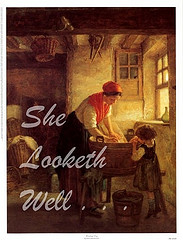I've been reading through Leviticus and it has been more exciting and convicting than one might think. This book is filled with the Judaic laws in reference to worshiping God in the Tabernacle. Last night I was reading chapter 6 and was hit with the picture of hell and God's wrath demonstrated there and in the animal sacrifices. The sacrificial system was set up as a precursor that pointed to the ultimate sacrifice of Christ on the cross. It is impossible for the blood of animals to take away sins. The people needed to see the effects of their sin and understand the requisites for God's justice for forgiveness and removal of guilt.
In verses 8-13 of chapter 6 there is such a strong emphasis for the fire on the altar to be kept burning continually because of it's repetition.
Then the LORD spoke to Moses, saying, 9 “Command Aaron and his sons, saying, ‘This is the law for the burnt offering: the burnt offering itself shall remain on the hearth on the altar all night until the morning, and the fire on the altar is to be kept burning on it. 10 The priest is to put on his linen robe, and he shall put on undergarments next to his flesh; and he shall take up the ashes to which the fire reduces the burnt offering on the altar and place them beside the altar. 11 Then he shall take off his garments and put on other garments, and carry the ashes outside the camp to a clean place.12 The fire on the altar shall be kept burning on it. It shall not go out, but the priest shall burn wood on it every morning; and he shall lay out the burnt offering on it, and offer up in smoke the fat portions of the peace offerings on it. 13 Fire shall be kept burning continually on the altar; it is not to go out.
In the Hebrew, Jeramy told me that the negative (NOT) is the intensive form of the negation as opposed to the passive form. It called to remembrance what Christ teaches about Hell in the New Testament. He repeats Isaiah 66:24 for emphasis also.
If your hand causes you to stumble, cut it off; it is better for you to enter life crippled, than, having your two hands, to go into hell, into the unquenchable fire, 44 where THEIR WORM DOES NOT DIE, AND THE FIRE IS NOT QUENCHED.] 45 If your foot causes you to stumble, cut it off; it is better for you to enter life lame, than, having your two feet, to be cast into hell, 46 where THEIR WORM DOES NOT DIE, AND THE FIRE IS NOT QUENCHED.] 47 If your eye causes you to stumble, throw it out; it is better for you to enter the kingdom of God with one eye, than, having two eyes, to be cast into hell, 48 where THEIR WORM DOES NOT DIE, AND THE FIRE IS NOT QUENCHED. (Mark 9:43-48)
Imagine worshiping in the Tabernacle and meditating on God's holy justice that requires death as a consequence of sin since the Fall. I considered that this picture of the altar is an image of hell in the Tabernacle, that a perpetual atonement was needed because of God's eternal, infinite nature. Imagine your body continually burning in fire on the altar! And being reminded of that every time you sin! But how is it possible to atone for one's own sin and receive God's forgiveness at the same time? That's why Christ came - to be the substitutionary atoning sacrifice in our place that we might receive forgiveness and live as God intended: free from the bondage of sin.












No comments:
Post a Comment